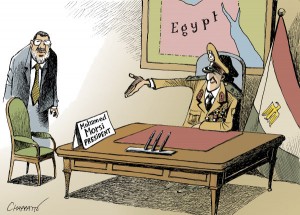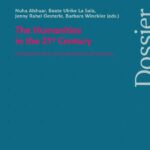Article published in:
openDemocracy
http://www.opendemocracy.net/amro-ali/egypt%E2%80%99s-morning-after-against-dictatorship-20
The Egypt Monocle
http://egyptmonocle.com/EMonocle/%E2%80%8Bop-ed-against-dictatorship-2-0-2/
Subtlety is not a strong feature of the Egyptian landscape, whether you look at its overt religious piety, emphasis on a person’s title, the fragrance generously sprayed that heralds a person’s arrival from 15 metres away, the imposing pyramids, or Judge Farouk Sultan’s protracted defence of the ‘divinely-sanctioned’ electoral commission before he could get around to just announcing the presidential winner. Yet the least subtle of any Egyptian agency has to be the league of ‘extraordinary’ gentlemen – the Supreme Council of the Armed Forces (SCAF). In seizing all branches of government, ripping up the constitution and pre-emptively defanging the Morsi presidency, SCAF have not only sought to turn the self-styled ‘Revolution 2.0’ into a ‘Dictatorship 2.0’, but have done so with a degree of recklessness, desperation and lack of imagination that leaves their hand even more exposed than before.
Decoding the socio-political hieroglyphics reads like this: New politics (revolutionaries and liberals) reluctantly united with religious politics (Muslim Brotherhood) to fight the union between old politics (Felul, former regime remnants led by Ahmed Shafik) and military politics (SCAF). Old politics (and the revival of corrupt patronage networks) has been dealt a death-blow. Now a considerable number of revolutionaries find themselves stuck in a marriage of convenience with the Muslim Brotherhood to take on the military council and their supplementary constitutional declaration, the timing of the next parliamentary elections in particular and a painfully-slow transition in general.
The Muslim Brotherhood’s electoral strength should not be overstated. Last month’s presidential elections illustrated that given the choice between a secularist candidate like Hamdeen Sabahi’s and felul/Islamists, Cairenes and, particularly, Alexandrians, will go overwhelmingly for the former. The Brotherhood cannot afford to alienate urban centres as it comes to the realisation that progressive politics has the upper hand in Egypt’s largest cities.
Say that a deal was struck between SCAF and the Brotherhood, history has shown time and again that it never lasts, often at the expense of Egypt’s welfare. This also explains why revolutionaries and liberals who boycotted the run-off elections seek to capitalise on an inevitable SCAF-Brotherhood clash and to nurture a third political-civil current.
Whatever one makes of the Morsi victory, the new president has inherited a martial reality that will compel him to deal with the military’s brazen consolidation of power over the security apparatus, civilian administration, and 18 of Egypt’s 27 governorates that are currently headed by retired generals. Not to mention the SCAF loyalists recruited to or retained in key ministries and industries. He will have to deal with this while seeking to revive a brutalised economy – addressing 12.4 per cent unemployment (youth unemployment: 25 per cent), 40 per cent under the poverty line; reforming the dysfunctional education system, labour laws, public finance, attracting investors again and reversing the frighteningly high crime wave – while not trespassing onto the military’s off-bound economic empire, which reportedly encompasses up to 40 per cent of the country’s economy. The structural tensions that ignited the 2011 Egyptian revolution are still present. For example, labour strikes have been ongoing and continue to hit at the nerve centre of SCAF’s economic enterprises.
Despite Egypt’s stock market rising 6.7 per cent following the peaceful Morsi triumph, Fitch Ratings notes overall that “recent [SCAF] developments will probably increase the risk of further social unrest and crush any hope of a change in economic policy. But in the extreme, this could lead to a second revolution, and thus a longer period of political uncertainty.”
SCAF and the former regime proxies have long engaged in a battle of hearts and minds to pin the blame of the country’s economic miseries on the revolution and their supporters in order to preserve the old order or some significant semblance of it. This is why the economy is facing an impending crash due precisely to SCAF’s prolonging of the transition in a series of short-sighted exploits that amounted to no more than power grabs. Tourism in decline, for example, was less to do with revolutionaries and Islamists, and much more to do with the state arresting civil society activists and airing xenophobic commercials.
This has raised suspicions that Morsi is being set up to fail and incur nationwide anger for the deteriorating economy. Yet his powers are so shamelessly limited one wonders how SCAF will manage to con the common Egyptian on the street, let alone the Brotherhood’s organisational apparatus that can be deployed fairly effectively to foment popular pressure. Morsi can help to soften any future public backlash by spreading the division of labour and creating the inclusive cabinet he has promised that will appeal to liberals, revolutionaries, Copts and women.
The public is no doubt exhausted with the socio-economic uncertainties, yet the ingredients that keep sparking mass protests are still there. There is a generational war of legitimacy that SCAF may or may not comprehend. Despite their differences, the revolutionaries and the Islamists have reaped more street cred from the 25 January Egyptian revolution than anyone else. Those 18 cataclysmic days have left Egypt with a Whitman’s Sampler of myths, symbols, constructs, martyrs, grievances, and narratives, as well as subsequent key flashpoints (Maspero massacre, Mohamed Mahmoud battle, Cabinet killings, Port Said tragedy and more) that have ever since inspired the growing audience of fearless youth (and much of the public). This has been sustained through social media, satellite TV, and on the streets. All this is challenging the hierarchical and communiqué-announcing archaic generals with their worn out myths of the 1952 ‘revolution’ and the 1973 October war. Whatever mystique the military had is gradually eroded as bodies were crushed under tanks at Maspero and female activists were stomped upon by jackboots.
Moreover, in Egypt’s post-revolutionary and anti-authoritarian climate, raw power can only take you so far. SCAF is not going to be grooming a fourth military dynasty; but the military is not retreating to their barracks in the foreseeable future.
The extended revolution may have to take many a further bloody twist and turn before the military elites eventually come round to seeing that it’s in their (and the country’s) long-term interests for a viable democratic Egypt to materialise with the necessary checks and balances that a healthy state requires to function. For now, the revolutionaries, liberals and even Islamists will need to organise more effectively into a cohesive bloc and exert a concerted effort if they hope to do more than just smell the aroma of a deSCAFinated Egypt.






